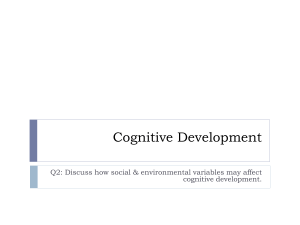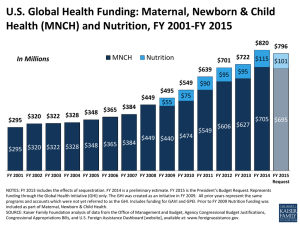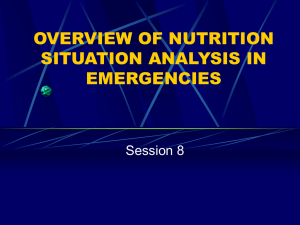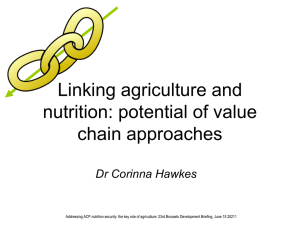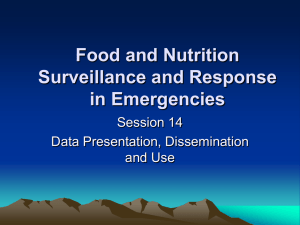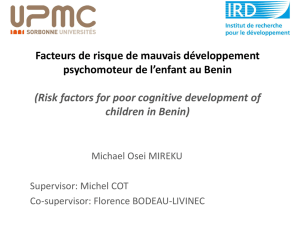- World Family Organization
advertisement
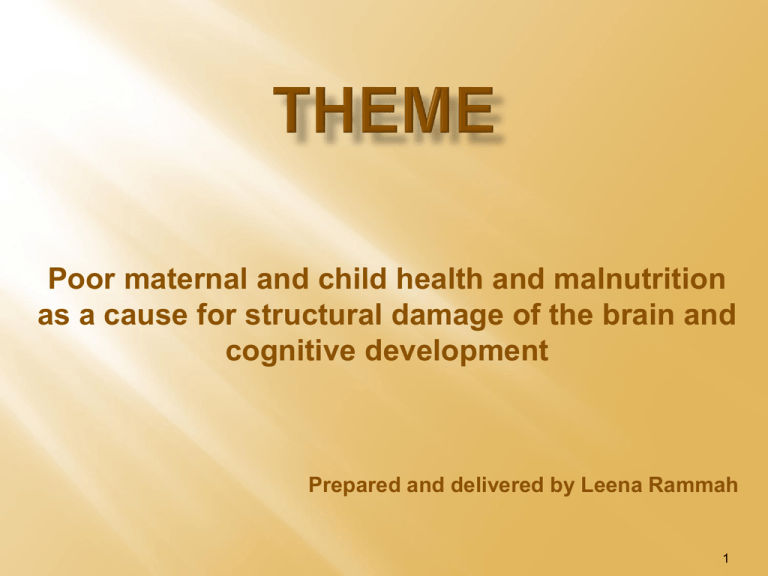
Poor maternal and child health and malnutrition as a cause for structural damage of the brain and cognitive development Prepared and delivered by Leena Rammah 1 Evidence shows - good health, nutrition of pregnant women and young children, along with an appropriate stimulation during the early years have an important positive effect on cognitive development. Deeper analysis shows maternal health and nutrition affects child’s health right from fetus brain development till later stages. 2 A concept that includes: Family planning Prenatal, and postnatal care Education provision Health promotion 3 Let us look at Health, Nutrition and Cognitive Development during two major phases: 1. Prenatal phase 2. Postnatal phase 4 Studies prove women with proper prenatal care have better health results than women who miss PNC during pregnancy. The health and the well being of women and their children are inter-linked. This process requires a substantial strengthening of the health system (DFID) 5 Factors that affect mother’s and child’s health and can damage brain development (prenatal) Early or late age pregnancies Premature delivery Contact with potentially toxic substances (e.g. alcohol tobacco, and drug abuse, etc. Existence of certain diseases (maternal measles, toxoplasmosis,..) 6 Factors that affect mother’s and child’s health and can damage brain development (prenatal) Exposure to Radiation Maternal attitudes and behaviors Absence of skilled health personnel during delivery High blood pressure (pre-eclampsia) Intake of certain medication due to illness Poor education 7 Factors that affect mother’s and child’s health and can damage brain development (perinatal) Intrauterine position Obstructed labor and asphyxia Prolonged labor Obstetrical trauma Pelvic fetus incompatibility 8 The younger the age at pregnancy, the greater the health risks for mother and child and the higher risk of infant mortality (60%) Children who survive are more likely to suffer from low birth weight, under nutrition and delayed cognitive development. (Lawn et al., 2006;UNICEF, 2008b; WHO, 2005). 9 Factors that affect child’s health and can damage brain development (postnatal) Postnatal care is likewise important and includes: Child birth Newborn’s care ECD’s education 10 Factors that affect child’s health and can damage brain development (postnatal) Poor disease prevention and vaccination Exposure to accidents Lack of physical activity Improper stimulation 11 Factors that affect child’s health and can damage brain development (postnatal) Lack of early education Lack of psychological and social care Lack of love and parents’ care, (bonding) Existence of Infectious diseases (Meningitis,..) 12 Maternal nutrition deficiency that affect brain and cognitive development (prenatal) Folic Acid deficiency Iron deficiency anemia (IDA) Iodine deficiency Omega 3 deficiency 13 Child’s nutrition deficiency that affect brain and cognitive development (postnatal) Iron deficiency and its effect upon brain and cognitive development. Iodine deficiency and its affects Vitamin A deficiency. Lack of exclusive breastfeeding till the age of six months. Insufficient supplementary food and of micronutrients introduced after the age of six with continuation of breast feeding well into the second year. 14 How do poor maternal and child’s malnutrition affect cognitive development? (Postnatal) Iron deficiency has been clearly linked to cognitive deficits in young children. Iron is critical for maintaining an adequate number of oxygen-carrying red blood cells, which in turn are necessary to fuel brain growth. (http://www.zerotothree.org/brainwonders). 15 Children who are malnourished usually: are fussy eaters are deprived of adequate calories are deprived of protein in their diet experience insufficient growth in early years suffer from lasting behavioral and cognitive deficits, including slower language and fine motor development, lowe IQ, and poorer school performance. (www.zerotothree.org/brainwonders) 16 How do poor maternal and child’s malnutrition affect cognitive development? (Postnatal) Breast milk contains all the amino and fatty acids needed for brain development. Research has shown that babies who are breast-fed as compared to babies who are formula fed score higher on IQ tests. 17 Child illness / malnutrition reduce cognitive development and intellectual performance, school enrolment and attendance. Intrauterine growth retardation and malnutrition during early childhood have long term effects on body size and strength with implication on productivity in adulthood (WHO 2006) 18 Micronutrient deficiencies can severely affect early cognitive development, including a loss of up to fifteen points on IQ test even in moderate forms. Children are also affected by Vitamin A deficiency which causes blindness, poor health and concentration (Victoria et al., 2008). 19 Intervention with stunted children IQ 110 non-stunted Both 105 stimulated supplemented 100 95 control 90 85 Baseline 6 mo 12 mo 18 mo Grantham-McGregor et al, 1991 24 mo 20 What is brain development in prenatal phase? Average Brain Weights at Different Times of Development: AGE BRAIN WEIGHT (grams) 20 weeks of gestation Birth 18 months old 3 years old Adult 100 400 800 1100 1300-1400 21 Brain development in prenatal phase The brain grows at an amazing rate during this period. From the 3rd week of Intrauterine life 250,000 neurons proliferate every minute. 22 Neurons which are continuously firing or activated, through stimulation will consolidate and strengthen over time. 23 The child has by birth 100 Billion Neurons. For the brain to function in proper way, these neurons have to be connected by synapses. These synapses can be developed by: 1. Appropriate nutrition, especially breast feeding, that helps to form myelin that cover the synapses and can allow the impulse to pass. 2. Early stimulation for the brain through interaction with the child. 24 Through ECD, a child may form and reinforce over 1 trillion connections. Combination between nutrition and stimulation that can affect cognitive development 115 110 105 Adopted before the age of 2 Adopted after the age of 2 100 95 90 85 Severe malnutrtion Moderate malntrtion Well nourished Study on level of intelligence among orphaned Vietnamese girls according to the level of nutrition. American Journal of clinical nutrition 1977, 30 25 Poor maternal health is associated with poverty Poverty reduction Intergenerational transmission of poverty preschool child low IQ, behaviour problems poor stimulation, nutrition & health National economy school poor school achievement behaviour problems adult low education low skilled / no work high fertility depressed/stressed Lancet Paper 1, S Grantham-McGregor 2007 26 Why invest in maternal health, newborn and child health? 1. The value of women and children’s health. 2. Inexpensive ways to save lives of women and children 3. The economic soundness. 4. The political soundness, including social stability and human security 5. The improvement of the health system. 27 A key to beat poverty Integration of disease prevention and care for mothers newborns and children makes economic sense as it maximizes benefits and minimizes costs for mothers, newborns and children. Indeed high under 5 mortality and morbidity and high level of malnutrition have a serious economic and development cost. (DFID) 28 Short-term distress in the form of rising malnutrition will have negative long-term consequences for education. 29 Situation analysis of health, education Many countries lack programs addressing health, nutrition, care, and education of children under 3, a critical period in life. World Arab States Central/East. Europe Sub-Saharan Africa East Asia/Pacific South/West Asia L. America/Carib. Central Asia N. America/W. Europe 0% 50% 100% Countries with at least one formal program for children under 3 in 2005 (%) Source: EFA Global Monitoring Report 2007. 30 10% of worldwide disease is caused by under nutrition (WHO 2005) According to 2007 MDG report, 84% of women who have completed secondary or higher education are attended by skilled personnel during child birth, more than twice the rate of mothers with no formal education (UNICEF 2008) Children of educated mothers are 50% more likely to survive until the age of 5 and beyond than those whose mothers who didn’t receive or complete schooling (UNICEF 2008) 31 To advocate for services that should include: Education on safe motherhood. Promotion of maternal nutrition. Supplementation of micronutrient and tetanus toxoid, where appropriate. Prenatal care and counseling. Delivery assistance in all cases by a skilled professional 32 Care for obstetric emergencies, including referral for pregnancy, childbirth, and abortion complications. Postnatal care. Promotion of longer intervals between births through family counseling. 33 Recommendations Postnatal care, including exclusive breast-feeding. Early stimulation for the brain of the child through interaction ECD as Holistic approach on policy level 34 Mrs. Lara Hussain Dr. Mahendra Sheth Dr. Malak Zalouk Mr. Moncef Moalla 35 Thank you 36
